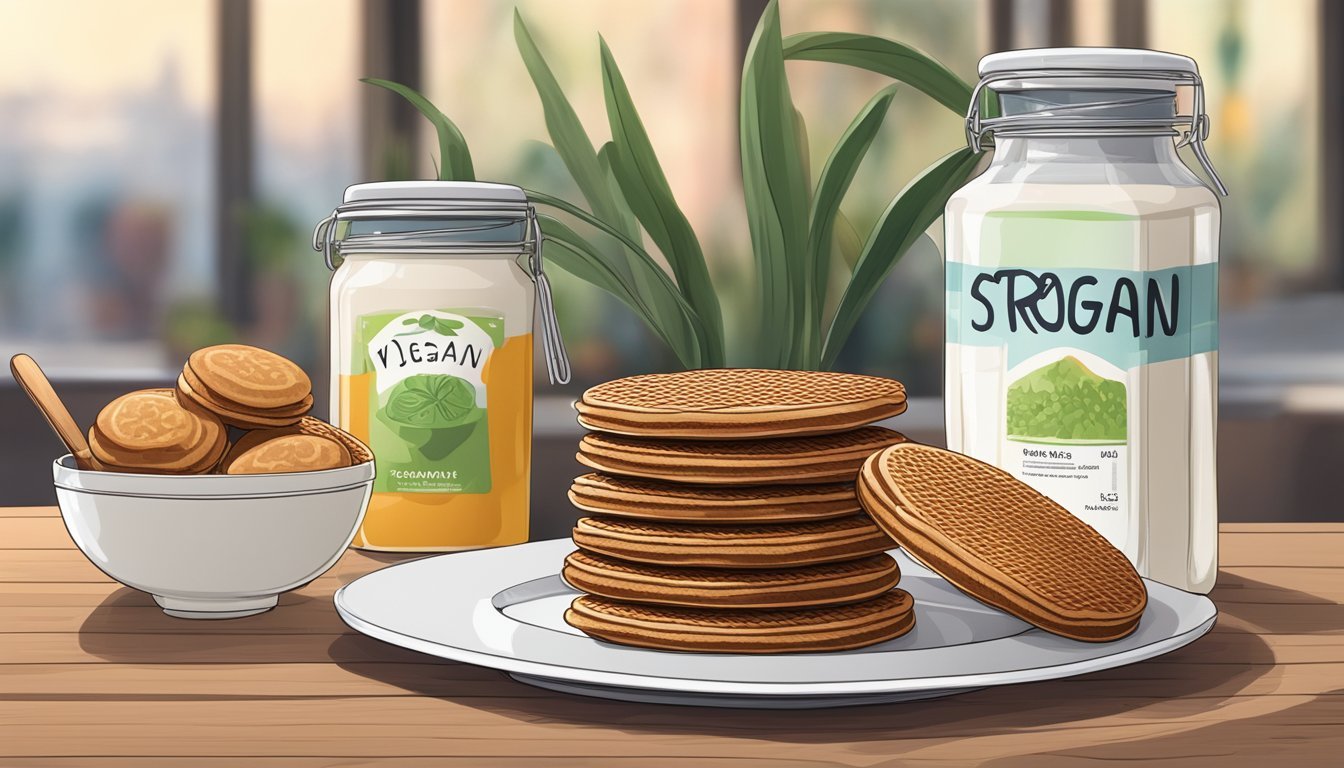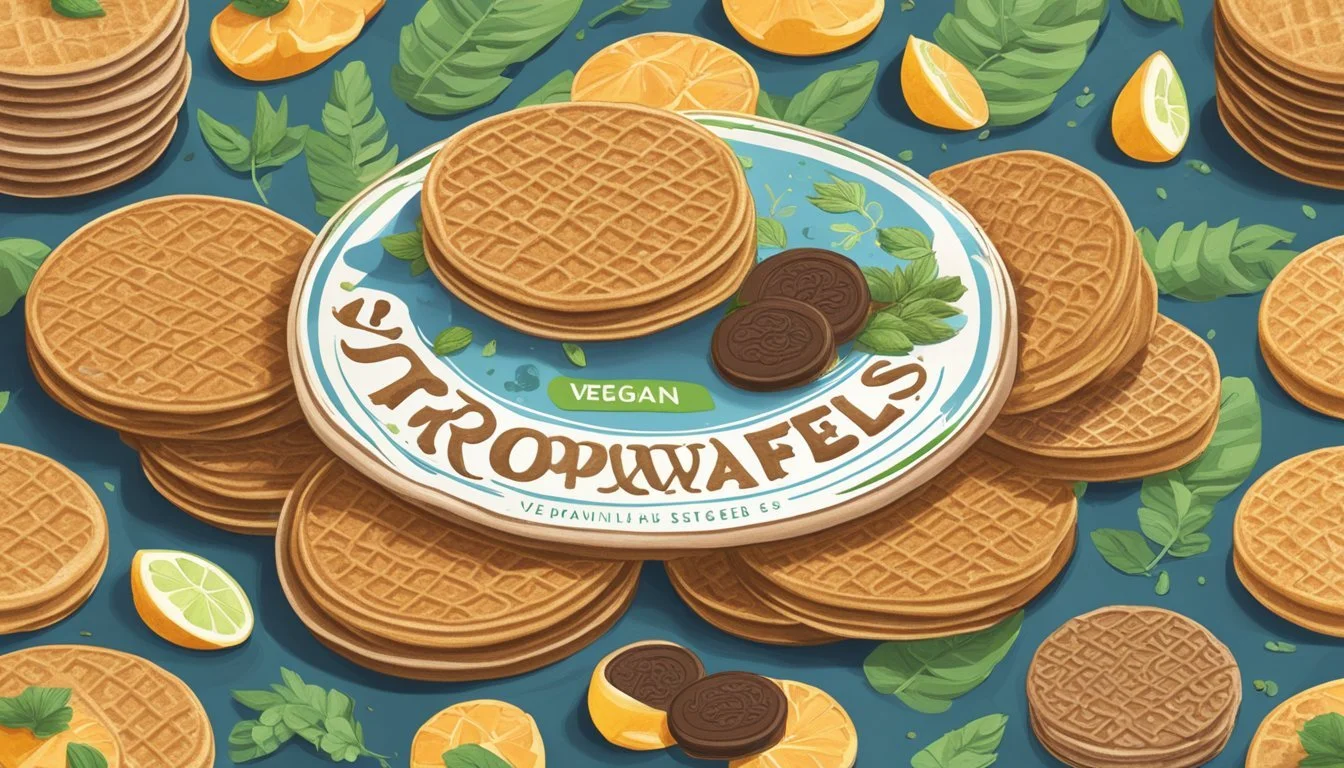Are Stroopwafels Vegan?
Unveiling the Ingredients
Stroopwafels are a traditional Dutch treat that have been enjoyed for centuries. These delightful sweets consist of two thin, waffle-like cookies that sandwich a layer of gooey caramel syrup, known as 'stroop' in Dutch. The classic recipe for stroopwafels includes ingredients like butter, eggs, and milk, integral for achieving the characteristic texture and flavor of the waffle and its filling.
However, this poses a challenge for those following a vegan diet as these ingredients are derived from animals. While traditional stroopwafels are not vegan, there has been a rise in the availability of vegan-friendly versions of this confectionery. These adaptations use plant-based substitutes to recreate the buttery taste and satisfyingly chewy texture without using any animal products. Vegan stroopwafels provide an inclusive alternative, ensuring everyone can enjoy the essence of this Dutch classic.
Stroopwafels Overview
Stroopwafels are a traditional Dutch dessert featuring two thin, crispy waffles with a caramel-like syrup filling. This section explores the origins and traditional components that make up a stroopwafel.
History of Stroopwafels
Stroopwafels originated in Gouda, Netherlands, during the 18th century. Initially, they were made from leftover crumbs and baked into waffles, with sweet syrups added to bind the leftovers together. Over time, stroopwafels evolved into the well-loved dessert known today, often served warmed to enhance the flavors of the caramel syrup, or stroop.
Traditional Ingredients
The classic stroopwafel dough is made from a mixture of flour, butter, sugar, yeast, and typically a small amount of milk and an egg to create a tender texture. Cinnamon is often added for a warm, aromatic flavor. The filling, or stroop, is a key component and consists of a caramel-like syrup made from brown sugar, butter, corn syrup, and vanilla extract. This syrup is spread between the two layers of baked dough to create the distinctive sweet and rich flavor profile of the stroopwafel.
Vegan Dietary Considerations
When exploring whether stroopwafels can fit into a vegan diet, one must consider what veganism entails, the common ingredients that are not vegan, and the nutritional aspects of adopting such restrictions. This section provides insights into these critical factors.
Veganism Defined
Veganism is a dietary and lifestyle choice that excludes all forms of animal products. This means no meat, dairy, eggs, or any ingredient derived from animal sources. Vegans often choose this lifestyle for ethical, environmental, or health reasons.
Common Non-Vegan Ingredients
In the context of stroopwafels, several ingredients traditionally employed are not vegan-friendly. These typically include:
Milk: A dairy product from cows or other animals.
Butter: Made from churned cream, also a dairy product.
Eggs: Often used in baking and cooking as a binding agent.
Each of these ingredients has derivatives or counterparts that can make a product unsuitable for a vegan diet. Stroopwafels may contain any of these components.
Health and Nutrition
A vegan diet hinges on the exclusion of ingredients like milk, butter, and eggs, compelling vegans to seek alternative sources for their nutritional needs. Key nutrients of concern include:
Protein: Necessary for cell repair and growth.
Iron: A mineral important for blood health.
Omega-3 fatty acids: Essential fats that are beneficial for heart health.
Calcium: Vital for bone health.
Vitamin B12: Important for nerve function and blood formation.
For optimal health, vegans should ensure their diet is balanced and accommodates all essential nutrients typically derived from animal products. Indulgent vegan foods, like stroopwafels, should be carefully evaluated to maintain health and nutrition within a vegan lifestyle.
Vegan-Friendly Stroopwafels
Crafting vegan stroopwafels involves careful ingredient selection to replicate the traditional caramel flavor and texture without animal products. Dedicated recipes and commercial brands offer delectable options for those adhering to a vegan lifestyle.
Substituting Ingredients for Vegans
The traditional stroopwafel recipe calls for ingredients like butter, milk, and eggs. To create a vegan version, one can substitute these with plant-based alternatives. Butter can be replaced with vegan margarine or oils, milk with almond or soy milk, and eggs with flaxseed or chia seeds mixed with water to bind the dough. The stroop, a caramel-like syrup filling, is typically made from brown sugar, butter, and heavy cream. For a vegan filling, one can use brown sugar, vegan butter, and coconut cream.
Here's a basic substitution list for a vegan stroopwafel:
Butter: Vegan butter or margarine
Milk: Almond milk, soy milk, or any other plant-based milk
Egg: Flaxseed or chia seeds (1 tablespoon mixed with 3 tablespoons of water equals one egg)
Cream: Coconut cream or a soy-based alternative
By adhering to these substitutes, vegans can enjoy stroopwafels while maintaining fidelity to their dietary choices.
Commercial Vegan Stroopwafels
Several brands have recognized the demand for vegan stroopwafels and now offer products that exclude all animal-derived ingredients. These stroopwafels can often be found in health food stores, specialty vegan shops, or purchased online through different webshops. Brands like Stroop Club and others have developed recipes that maintain the authentic taste and texture of traditional stroopwafels while ensuring the ingredients are 100% vegan.
The vegan varieties typically feature a sweet, vegan syrup made from plant-based ingredients sandwiched between two thin waffle cookies spiced with cinnamon. To entice new customers, these webshops might offer discounts or sample packs for first-time buyers.
Online Availability:
Webshops: Offer a variety of vegan stroopwafels
Discounts: Often available for first-time purchases or bulk orders
Shoppers looking for vegan stroopwafels are encouraged to read labels and inquire about ingredients when purchasing, as brands might alter recipes. They can relish in the rich, caramel-infused treat without the inclusion of milk, butter, or eggs—all thanks to the innovation in vegan baking.
Other Dietary Accommodations
When considering dietary restrictions and allergies, a wide range of options is available for those seeking to enjoy stroopwafels without compromise. Manufacturers are increasingly attentive to the needs of individuals with specific dietary requirements.
Gluten-Free Options
For consumers who are gluten intolerant or have celiac disease, gluten-free stroopwafels are a reality. Gluten-free stroopwafels substitute regular flour with a blend that may include rice flour, potato starch, and other gluten-free alternatives. To ensure structural integrity and prevent crumbling, xanthan gum is often added. When choosing gluten-free stroopwafels, individuals should look for products labeled as certified gluten-free to avoid cross-contamination.
Ingredients to look for:
Rice flour
Gluten-free baking powder
Xanthan gum (for texture)
Allergen Information
Customers concerned with allergens will find that stroopwafels can cater to nut-free, lactose-free, and dairy-free diets. Many brands are careful to avoid common allergens such as nuts, peanuts, and sesame in their recipes. However, since stroopwafels traditionally contain butter, dairy-free versions are created using plant-based alternatives like margarine or oil-based spreads. For lactose-intolerant individuals, these adaptations make the product more digestible.
Common allergens not present in allergen-friendly stroopwafels:
Nuts
Peanuts
Sesame
The syrups used are generally made without corn syrup, favoring simpler ingredients like brown sugar and molasses, which are also considered vegan-friendly. For those observing halal or kosher dietary laws, look for certifications on the packaging. It is crucial for consumers to read labels carefully and, when in doubt, consult the manufacturer for detailed allergen information.
Making Stroopwafels at Home
Crafting stroopwafels at home allows one to tailor ingredients for vegan preferences without compromising the sweet, caramel essence of the treat. It's essential to follow a vegan stroopwafel recipe closely and have the proper equipment on hand, such as a stroopwafel iron or waffle maker.
Homemade Vegan Stroopwafel Recipe
Ingredients:
2 cups all-purpose flour (gluten-free if necessary)
1/2 cup brown sugar
1 cup vegan margarine
1/2 cup plant-based milk, lukewarm
1 flax egg (1 tbsp ground flaxseed mixed with 3 tbsp water)
2 tsp baking powder
A pinch of salt
1 tsp cinnamon
1 tsp vanilla extract
Vegan Stroop (filling):
1 cup brown sugar
1/2 cup vegan butter
1/4 cup plant-based milk
1 tbsp corn syrup (or alternative liquid sweetener)
1 tsp vanilla extract
To prepare the vegan stroop, one combines brown sugar, vegan butter, plant-based milk, and corn syrup in a saucepan. They must bring the mixture to a boil and allow it to cook over medium heat for 3-5 minutes until slightly thickened, stirring occasionally.
For the dough, they must mix flour, vegan margarine, brown sugar, plant-based milk, flax egg, baking powder, salt, cinnamon, and vanilla extract into a consistent dough. The dough should then be divided into small balls.
Stroopwafel Iron and Other Equipment
To cook stroopwafels, one requires a stroopwafel iron or a shallow waffle maker capable of producing thin waffles. These appliances are instrumental in achieving the classic, crisp texture that characterizes a perfect stroopwafel.
Here's a straightforward method:
Heat the stroopwafel iron or waffle maker.
Place a ball of dough onto the iron.
Cook until golden brown, usually for about 1-2 minutes.
Once the waffles are ready, they slice each waffle horizontally to create two thin layers and spread the warm stroop on one half before sandwiching them back together. It is essential to work quickly as the stroop becomes more challenging to spread as it cools.
Homemade stroopwafels require attention to detail and the right set of tools, but they can be made successfully at home with a bit of practice. The result is a warm, sweet, and satisfying treat that caters to vegan dietary needs.
Cultural Significance
Stroopwafels are deeply ingrained in Dutch heritage and are considered a culinary symbol of the Netherlands, much like Gouda cheese. In Amsterdam and throughout the country, these treats are more than just a snack; they embody tradition and cultural pride. The origins of stroopwafels date back to Gouda in the late 18th or early 19th century, initially made from leftover breadcrumbs and syrup.
The popularity of stroopwafels has transcended the Dutch borders, finding a place in the hearts of people worldwide. In Amsterdam, tourists often seek out authentic stroopwafel experiences, looking to enjoy them fresh from market stalls and traditional bakeries. The ritual of placing a stroopwafel atop a hot beverage to warm the syrupy filling is a practice enjoyed by many.
Notably, stroopwafels are typically made with ingredients that are not vegan-friendly, such as butter and eggs. However, with the growing demand for inclusive dietary options, vegan stroopwafels are emerging. These options ensure that the cultural experience of enjoying a stroopwafel can be shared by all, regardless of dietary restrictions.
The annual celebration of National Stroopwafel Day is a testament to their cultural significance. This day is marked with enthusiasm, symbolizing not only a treat but the rich history and communal joy that stroopwafels represent for the Dutch people.
Dutch Food Item Cultural Significance Stroopwafel Symbol of Dutch tradition, enjoyed nationally and loved internationally Gouda cheese Another culturally significant Dutch food, originating from the city of Gouda
Each stroopwafel enjoyed is a nod to the Netherlands' rich culinary history, a history that continues to evolve with the introduction of vegan variations.
Purchasing and Consumption
When seeking to purchase stroopwafels, consumers will find a variety of options ranging from authentic Dutch-made to plant-based varieties suitable for vegans. These sweet snacks are traditionally enjoyed with coffee or tea and can be warmed up to enhance their flavor.
Where to Buy Stroopwafels
Stroopwafels are available in numerous stores and can be conveniently ordered online. They can be found in:
Specialty Stores: Stores that specialize in European or Dutch products often carry stroopwafels.
Grocery Stores: Many grocery chains have a selection of stroopwafels in their international or cookie aisles.
Online Retailers: Platforms like Amazon offer a wide range of stroopwafel brands and flavors with the option for shipping even to PO boxes.
Webshops: There are webshops dedicated to stroopwafels, offering multiple options including vegan and gluten-free variations, and often provide international shipping.
Purchasers should check the product details to ensure the stroopwafels fit their dietary preferences, especially if they require vegan options.
Sustainability and Ethical Considerations
In the context of stroopwafels, assessing sustainability and ethical considerations involves examining the environmental impact of ingredients, sourcing practices, and the life cycle of packaging and shipping.
Environmental Impact of Ingredients
Key ingredients in traditional stroopwafels include flour, butter, sugar, eggs, and the distinctive syrup that holds the wafers together. For a product to be deemed vegan, none of these ingredients can be sourced from animals. Vegan stroopwafels would typically substitute plant-based alternatives such as soy or almond milk for butter, and agave syrup or other plant-based sweeteners for honey or syrup.
Flour: Opt for organic, non-GMO flour to ensure that environmental harm is minimized during the cultivation process.
Palm Oil: When utilized, it should be RSPO certified, affirming that the palm oil was sourced in a manner that is conscious of environmental and social impacts.
Ethical Product Sourcing
Ethical sourcing goes beyond simply ensuring products do not contain animal ingredients. It involves:
Selecting organic materials to reduce chemicals used in production.
Prioritizing fair trade certified ingredients to support equitable trade practices.
Ensuring a transparent supply chain that allows consumers to trace the origin of the ingredients.
Packaging and Shipping
Sustainable practices extend to packaging and shipping, which need to be designed to reduce ecological footprints:
Packaging: Use of materials such as 100% post-consumer recycled cartons helps lower the environmental impact.
Return Policy: Implementing a policy that encourages reuse or recycling of packaging can further sustainability efforts.
Shipping: Choosing carbon-neutral shipping options or companies with a focus on sustainability helps to minimize the overall carbon emissions associated with the product.
Product Preservation
When it comes to preserving stroopwafels, understanding proper storage methods and shelf life is crucial to maintain their freshness and quality.
Storage and Shelf Life
Stroopwafels should be stored in a cool, dry place to ensure their longevity. Exposure to heat or moisture can lead to a compromise in quality and even spoilage. The original packaging often provides adequate protection, but once opened, it's advisable to transfer the wafels to an airtight container to keep them fresh.
The shelf life of stroopwafels varies depending on the presence of preservatives and whether they are homemade or commercially produced. Typically, most stroopwafels will have a shelf life ranging from:
Commercially produced with preservatives: Up to 6 months
Commercially produced, preservative-free: 1 to 3 months
Homemade: 2 to 3 weeks
It's important to check the expiration date on the packaging and note any storage recommendations from the manufacturer. If the product contains dairy ingredients, it may have a shorter shelf life and require refrigeration.
Note: Vegan stroopwafels, which exclude animal products, can sometimes have a different shelf life compared to their traditional counterparts. Always refer to the manufacturer's guidelines for the most accurate information regarding your specific brand of stroopwafels.
Additional Information
This section provides detailed insights into the customer service experience related to vegan stroopwafels, and the procedures to set up a wholesale account for bulk purchases.
Customer Service Experience
When purchasing vegan stroopwafels, customers can expect a robust customer service experience from webshops. It is typical for a webshop to have a clear return policy, which allows customers to return products within a specified time frame if their expectations are not met. In addition, for issues such as registration or password recovery, customer service desks are equipped to provide immediate and clear instructions. Help with placing or managing repeat orders is also commonly offered, ensuring a seamless shopping experience.
Creating a Wholesale Account
For businesses interested in bulk purchasing vegan stroopwafels, creating a wholesale account is a straightforward process. Typically, interested parties must complete a registration form and provide pertinent details, such as:
Business name and contact information
Tax identification number
Resale certificate number (if applicable)
Once the registration is approved, buyers will receive a unique wholesale account login. With these credentials, they can place orders at wholesale prices and have the convenience of tracking and repeating orders as needed. It's important to protect the password associated with the wholesale account to ensure security and prevent unauthorized access.










